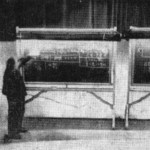Einstein
"It followed from the special theory of relativity that mass and energy are both but different manifestations of the same thing — a somewhat unfamiliar conception for the average mind." -Albert Einstein
You've heard and seen it plenty of times: Einstein's most famous equation, E = mc2. I've taken you inside this equation before, which lays out how much energy is stored in matter-at-rest, and tells you how much energy you need to create matter in the first place.
Image credit: Niels Madsen, ALPHA / Swansea / CERN.
That's right, you can create matter directly from energy; we do it all…
"Anyone who has never made a mistake has never tried anything new." -Albert Einstein
Back when Einstein first proposed his theory of General Relativity, his revolutionary picture of the Universe was met with a mix of curiosity, awe, and intense skepticism. It isn't every day that your most cherished of all physical theories -- the theory of Newtonian Gravity that had ruled the cosmos for nearly two-and-a-half centuries -- gets challenged by a newcomer.
Image credit: Brooks/Cole - Thomson publishing, 2005.
And yet, that's exactly what Einstein did when he proposed General Relativity at the…
"The views of space and time which I wish to lay before you have sprung from the soil of experimental physics, and therein lies their strength. They are radical. Henceforth space by itself, and time by itself, are doomed to fade away into mere shadows, and only a kind of union of the two will preserve an independent reality." -Hermann Minkowski
When it comes to gravity, you probably think you understand it pretty well.
Image credit: Heavens Above, via http://heavens-above.com/.
Everything with mass (or energy) attracts everything else with mass-or-energy, explaining everything from falling…
We have a guest blogger this week. Documentary-log.com offers free online documentaries and wanted to reach out to the science community. Read more about their organization and the many science documentaries available to view below.
As the Festival approaches and excitement continues to build we are delighted to present to you a collection of documentaries that tackle some of the scientific questions of our time.
You're never too young to become obsessed with science. In fact, Einstein was barely into his twenties when he started working on some of the equations that still influence popular…
Sez the Economist:
For, according to Dr Pyykko's calculations, relativity explains why tin batteries do not work, but lead ones do.
His chain of reasoning goes like this. Lead, being heavier than tin, has more protons in its nucleus (82, against tin's 50). That means its nucleus has a stronger positive charge and that, in turn, means the electrons orbiting the nucleus are more attracted to it and travel faster, at roughly 60% of the speed of light, compared with 35% for the electrons orbiting a tin atom...
If the problem isn't immeadiately obvious to you, pause a moment before proceeding…
A reader emailed me with a few questions regarding How to Teach Physics to Your Dog, one of which is too good not to turn into a blog post:
What is a photon from an experimental perspective?... Could you perhaps provide me with a reference that discusses some experiments and these definitional issues?
The short form of the experimental answer is "A photon is the smallest amount of light that will cause a detector to 'click.'" (For some reason, hypothetical light detector technology has never really advanced past the Geiger counter stage-- even though it's all electrical pulses these days, we…
Over in yesterday's communications skills post commenter Paul raises a question about priorities:
I wonder to what extent good writers, public speakers and communicators are being promoted in science in place of good thinkers - people who can challenge prevailing dogma, invent promising novel approaches to old problems, and who have the intuition needed for deducing correct theories from just a few observations.
I think of this as the "Weinstein Perelman Theory" because Eric Weinstein on Twitter has been pushing something similar with respect to Grisha Perelman turning down major math…
Much has been written of late about the nature of denialism. New Scientist a couple of issues back produced a special report on the subject, for example, and the New Humanist explores the idea of "unreasonable doubt."
There's plenty more out there. The most provocative I've come across (thanks to Joss Garman via DeSmog Blog's Brendan DeMelle) is a 2009 paper in the journal Studies in History and Philosophy of Modern Physics by Jeroen van Dongen of the Institute for History and Foundations of Science at Utrecht University in The Netherlands. His thesis is ideologically based denialism of…
I get asked my opinion of Bohmian mechanics a fair bit, despite the fact that I know very little about it. This came up again recently, so I got some suggested reading from Matt Leifer, on the grounds that I ought to learn something about it if I'm going to keep being asked about it. One of his links led to the Bohmian Mechanics collaboration, where they helpfully provide a page of pre-prints that you can download. Among these was a link to the Bohmian Mechanics entry in the Stanford Encyclopedia of Philosophy, which seemed like a good place to start as it would be a) free, and b) aimed at a…
tags: The World's Smallest Horse, miniature horses, animals, pets, selective breeding, artificial selection, streaming video
The world's smallest horse, a colt named Einstein, was born 22 April 2010 on a farm in Barnstead, New Hampshire. Just 14 inches tall and weighing only 6 pounds at birth, Einstein appears to have beaten the previous "world's tiniest horse" record holder by three pounds. This raises the question: how small can humans force horses to evolve through selective breeding? Apparently, pretty damned small, according to equine geneticist Samantha Brooks of Cornell University, who…
Via Twitter, Michael Barton is looking for some good books about physics. I was Twitter-less for a few days around the period of his request, and this is a more-than-140-characters topic if ever there was one, so I'm turning it into a blog post.
The reason for the request is that he's going to be working as an intern at the Einstein exhibit when it visits Portland, which makes this a little tricky, as relativity is not an area I've read a lot of popular books in (yet-- that's changing). That will make this a little more sparse than it might be in some other fields.
There's also an essential…
Three posts in one day. And all of such high quality. You lucky people.
Pascal has a go at explaining the std.nutters. Some of it is the usual correct stuff, but some of it is wrong: What you need, over and above all that, is constant social interaction with other practising scientists. Oral tradition and daily exposure to other scientists' everyday decisions are indispensable. That sounds fairly plausible, doesn't it? Until you think of Newton. Or indeed, of Einstein.
On June 30, 1905 Albert Einstein published his paper on Special Relativity with the paper "On the Electrodynamics of Moving Bodies" in the journal Annalen der Physik (original German version in pdf here).
This was Einstein's third of what have become known as the Annus Mirabilis papers (Latin for "extraordinary year") and revolutionized the field of physics by reconciling Maxwell's equations for electricity and magnetism with the laws of mechanics. He was 26 years old. In this paper Einstein also dispelled with the concept of "luminiferous ether" (proposed by Isaac Newton in 1704), a…
tags: TEDTalks, einstein, African Grey Parrot, Stephanie White, streaming video
This video is a whimsical wrap-up of TED2006 -- presented by Einstein, the African grey parrot, and her trainer, Stephanie White. Watch for the moment when Einstein has a moment with Al Gore [5:49]
Today's free book is "Einstein for Beginners" a comic style introduction to Einstein's life and work by Joseph Schwartz and Michael McGuiness
To claim the book, be the first commenter to assiduously affirm that you will read and review the book in less than 6 months and then send me your snail mail address to science dot woman @ google's mail service.
Apparently, this is becoming a good place for people to get their questions answered! My friend Brian, recently wanted to know what the possibilities were for faster-than-light travel. Specifically, he was interested in it because he wants humans to do it.
Brian: but otherwise how will we ever have a civilization like that in Star Trek?
Presumably, Brian's goal is to be able to travel nearly instantaneously between any two points in the galaxy. The problem is that there are physical laws we have to obey; we don't have a choice. One of them is special relativity, which tells us that the…



